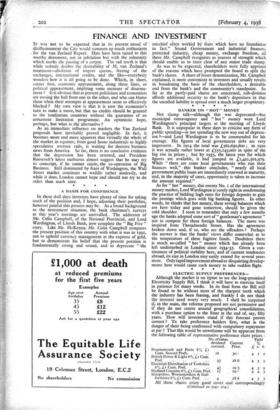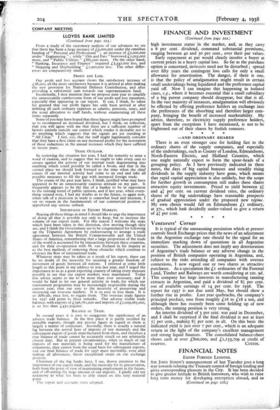ELECTRIC SUPPLY PREFERENCES— Although the market is on tiptoe to
see the long-promised Electricity Supply Bill, I think it will have to exercise itself in patience for many weeks. In its final form the Bill will be found to be without most of the sharpest teeth which the industry has been fearing, and frankly I do not think the investor need worry very much. I shall be surprised if, in the main, the reforms proposed are not permissive and if they do not centre around geographical consolidation, with a purchase option to the State at the end of, say, fifty years. How will investors stand if this forecast proves correct ? To take preference holders first, what is the danger of their being confronted with compulsory repayment at par ? That this would be unwelcome will be apparent from the following table of representative preference share prices :
No. of times Yield dividend Current covered. Price. £ s. d.
Bournemouth and Poole 6% kr
Cum. Second Prefs. .. .. 18 4 I 9 British Power & Light 6% Li Cum.
Pref. . • .. .. .. 3i 286 4 5 3 Electrical Distribution of Yorkshire 6% ft Cum. Pref. . 411. 293 4 3 9 Midland Counties 6% ki Cum. Pref. 2i 29h 4 4 3 Shropshire, Worcestershire & Staf- fordshire 6% ki Cum. Pref. . • 4 2.86 4 5 3 All these shares enjoy ,good cover and correspondingly (Continued on page 204.)
FINANCE AND INVESTMENT
(Continued from page 202.) high investment status in the 'market, and, as they carry a 6 per cent. dividend, command substantial premiums, ranging between 40 and 50 per cent., over their par values.
Early repayment at par would clearly involve a buyer at current prices in a heavy capital loss. So far as the purchase option is concerned, investors need not be disturbed ; spread over fifty years the contingent loss calls for only a small allowance for amortisation. The danger, if there is one, is that the policy of amalgamation might result in certain small undertakings being liquidated and the preference capital paid off. Now I can, imagine this happening in isolated cases, e.g., where it becomes essential that a small subsidiary of a big parent company should disappear, but that is all. In the vast majority of instances, amalgamation will obviously be effected by offering preference holders an exchange into the preferences of the absorbing and therefore larger com- pany, bringing the benefit of increased marketability. My advice, therefore, to electricity supply preference holders, apart from the exceptions I have mentioned, is not to be frightened out of their shares by foolish rumours.
* * * *















































 Previous page
Previous page